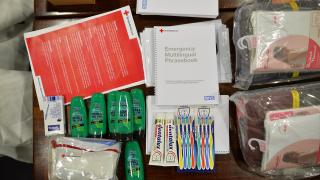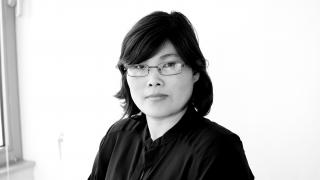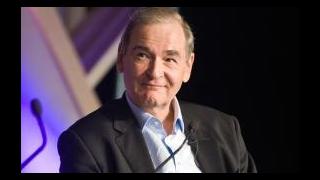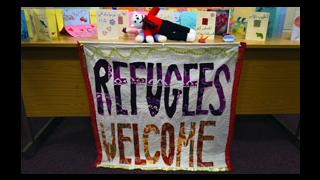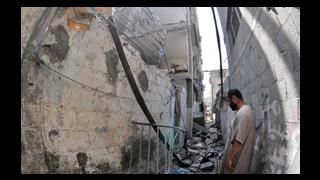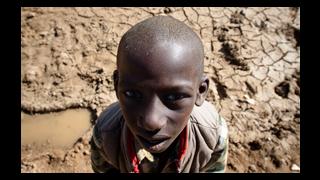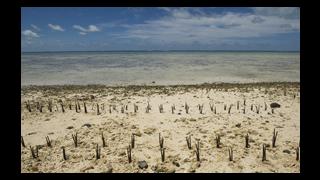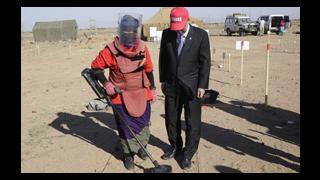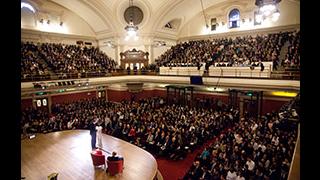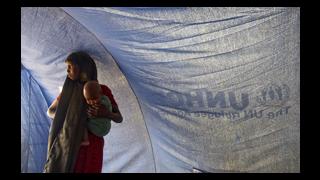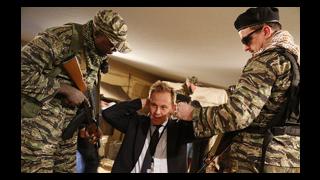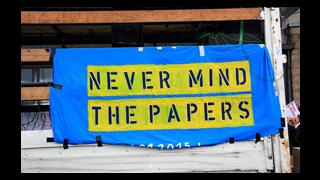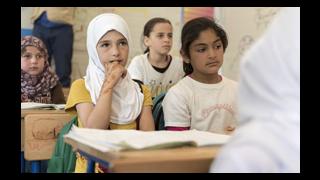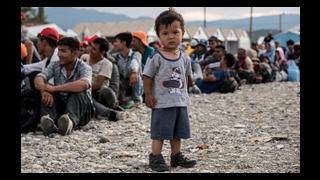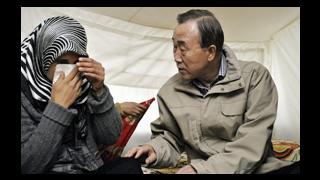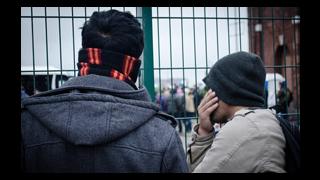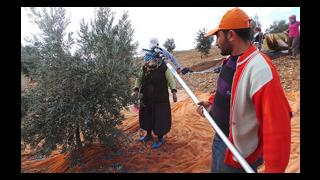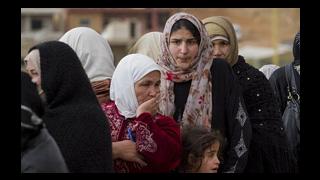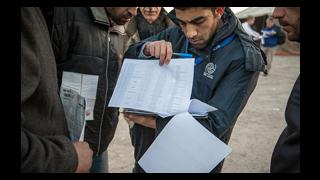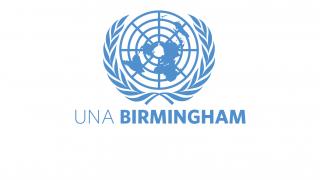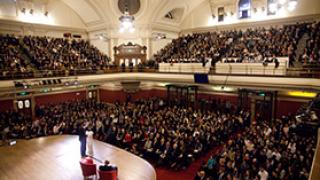
On 5 February, UNA-UK was delighted to host UN Secretary-General Ban Ki-moon. The event, held in association with Chatham House, took place at London’s Central Hall Westminster, where the UN held its first meetings in 1946 and where the first Secretary-General, Trygve Lie, was elected.
Over 2,000 people braved the cold weather and queues snaking around the building for what was probably Mr Ban’s last major public appearance in the UK, as he prepares to step down this December after 10 years in post. The audience consisted of representatives from Government and Parliament, NGOs, universities, business and media, as well as UNA-UK members and supporters, some of whom were part of the first wave of enthusiasm for the UN seven decades ago, and some just three months old.
Mr Ban was introduced by Baroness Anelay, UK Minister of State with responsibility for the UN. She reminded participants that in 1945 the success of the UN was by no means guaranteed, but that “today, with its 193 members working together ... it sets norms, builds consensus, mediates conflicts, enforces agreements, holds states to account [and] coordinates disaster relief”. Describing the UN as the “world’s leading multilateral organisation”, she said that the UK was “proud” of its contribution, noting its pledges to meet the 0.7 per cent development and two per cent NATO spending targets, as well as its support for humanitarian action and peacekeeping. She thanked Mr Ban for his “drive, dignity and commitment”, saying that she was “personally committed” to ensuring that the UK continues to play a leading role at the UN.
Natalie Samarasinghe, UNA-UK’s Executive Director, used her opening remarks to say that while “the headlines may not always reflect it, there is a strong core of people in this country who care about global issues and who want to engage with the UN”. Noting that the selection process for Mr Ban’s successor was underway, she expressed hope that his speech would remind people just how important the role of UN Secretary-General is, and that people would “follow this process just as closely as the other selection drama unfolding across the pond”.
In his wide-ranging speech, Mr Ban praised the UK as a leading humanitarian donor, highlighting its recent decision to increase financial assistance to Syrian refugees. Referring to his own displacement as a child, he spoke of the need to “counter dangerous myths about refugees” and of the UN’s role in helping people to rebuild their lives after conflict.
Afterwards, he engaged in a lively discussion with UNA-UK’s Chairman, Sir Jeremy Greenstock, covering issues from LGBT rights to Israel–Palestine to the moral authority of the Secretary-General. Thousands of people submitted questions ahead of the event, which was trending on Twitter for most of the day, as participants posted hundreds of photos with captions such as ”poignant, humble, inspirational”, “bucket list tick” and “dream come true. You were the bomb, Mr Ban”. A condensed version of Mr Ban’s speech is featured below. Click here to read the full transcript and click here to watch the recording.
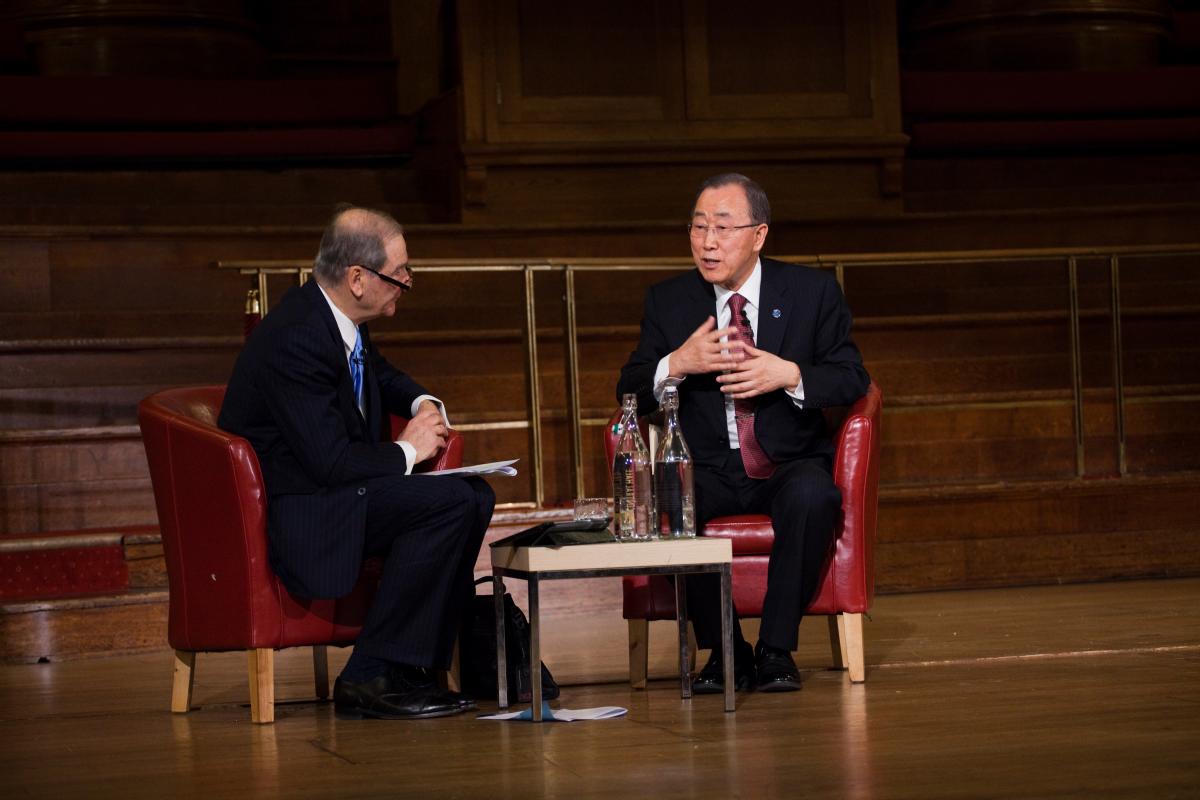
The Secretary-General’s address
It is a great honour and a very moving experience that I am standing at the same podium where, 70 years ago, our founding fathers of the United Nations were gathered to talk about the future of our world right after the terrible and tragic consequences of the Second World War.
Heartbreak was fresh as delegates gathered here in early 1946. Across a continent, cities were still filled with rubble, and families were reeling from their losses. In Britain, food was still rationed and young men faced military conscription. But hopes were very high. Seven months earlier in San Francisco, states had adopted the United Nations Charter. Seventy years ago this week, here in this Hall, the United Nations took its first tangible steps, including the appointment of a Secretary-General
Heartbreak was fresh as delegates gathered here in early 1946. Across a continent, cities were still filled with rubble, and families were reeling from their losses. In Britain, food was still rationed and young men faced military conscription. But hopes were very high. Seven months earlier in San Francisco, states had adopted the United Nations Charter. Seventy years ago this week, here in this Hall, the United Nations took its first tangible steps, including the appointment of a Secretary-General
I want to pay special tribute to one person who was in this chamber at that time. He is one of the great teachers: Sir Brian Urquhart. Next to my great predecessor Dag Hammarskjöld, no one in UN history has better embodied the ideal of global service and the principles of the Charter.
The United Nations has succeeded at the job for which it was founded: to protect succeeding generations from a third world war. In that regard, I think we can be a little bit proud, and the United Kingdom has been a key partner every step of the way. You have championed human rights, international law and agreements such as the Arms Trade Treaty. You are a leading humanitarian donor – as we saw again yesterday with your generous pledges for Syrian refugees and Syrian people under siege. And at a time when others are cutting back on development aid, Britain has ring-fenced its own vital support for the world’s poorest and most vulnerable people. I really appreciate the contribution and leadership of the United Kingdom.
Today we need UK contributions more than ever. The world is being tested. People worry about the next extreme storm, terrorist attack, financial shock or outbreak of deadly disease.
Yet through all this I am confident about our future. I take heart in part from the two landmark achievements of last year: the 2030 Agenda for Sustainable Development and the Paris Agreement on climate change. These are two important visions and commitments adopted and laid out by world leaders. They have shown a sense of purpose, and a sense of unity, despite political, ideological and religious differences.
The Millennium Development Goals which were adopted in 2000 generated remarkable gains. The new Sustainable Development Goals will take us even further. Human rights and women’s empowerment are major threads, as are good governance and other critical factors for stability. Crucially, the new goals are universal, applying to all countries, since even the wealthiest societies have yet to fully conquer inequality or exclusion.
The Paris Agreement is a very important turning point in putting our people and our earth onto a sustainable path, where we will be able to contain the rise of global temperature below two degrees or even 1.5. Without that, we will have serious consequences affecting not only us but our whole world. It seems that people believe we have two planet earths, but we only have one. We cannot negotiate with nature. The Agreement marks a change in our way of thinking.
So I have great hope. At the same time, the world faces undeniable dangers.
The savagery in Syria will soon enter its sixth year. We must continue to press for an end to the fighting, sieges and abuses of human rights. Yemen is also in flames. Coalition air strikes in particular continue to strike hospitals, schools, mosques and civilian infrastructures.
In this world, at this time, more than 125 million people need immediate humanitarian assistance. If all those people lived in one country, it would be the 11th largest country in the world. These numbers are unsustainable. The human costs are intolerable.
I myself was once a displaced person. Some of you might have read my life story. I was born in Korea just before the end of the Second World War. When I was six years old the Korean War broke out and I had to flee my home with my parents without knowing where to go. Life was miserable, terrible.
We survived on food and medicine provided by the United Nations. The UN Children’s Fund, UNICEF, provided humanitarian assistance – including powdered milk and small toys. The UN Educational, Scientific and Cultural Organization, UNESCO, provided us with textbooks and note paper. More importantly, the United Nations provided us with security, exercising for the first time the authority to maintain international peace and security through a Security Council resolution. Sixteen nations provided their soldiers, including many young men from the United Kingdom, many hundreds of whom died in the battlefield.
Without the United Nations, I would not be able to stand before you today. If I think about all that happened to me and to my country, to my people, I was able to survive only because of the United Nations. And now I’m standing here as the Secretary-General and feeling humbled. At that time, the United Nations blue flag was a beacon of hope to me. And I’m much more humbled now when I travel around the world and see that still, to many people, the United Nations flag, the United Nations logo itself, are beacons of hope. I have no other choice but to be motivated and give all that I have.
This is what I’ll tell you, particularly the young people here. You may not appreciate all this wealth and happiness and stability as much as I or my generation did, or as much as many people around the world who are living in very difficult conditions would. Don’t take it for granted. I’m asking you to look beyond the United Kingdom, which is one of the most powerful and richest countries in the world.
Today, many people are struggling to survive. People who cross the Aegean Sea, Mediterranean Sea or the English Channel in search of better lives are symptoms of problems, not themselves cause for suspicion. We must counter those who promote dangerous myths about refugees and migrants. We must look at the roots of the conflicts and governance failures that compel people to undertake perilous journeys.
Across the United Nations, we are placing greater emphasis on prevention. The Human Rights up Front initiative calls on us to act early in response to violations of human rights, before countries reach the point of no return.
The United Nations Plan of Action to Prevent Violent Extremism focuses on underlying drivers of radicalisation and the need to avoid approaches that end up alienating the people we are trying to reach.
In Istanbul in May, we are going to convene a humanitarian summit meeting to help the 125 million people who need our immediate support.
We continue to advocate the Responsibility to Protect, especially to build up national capacities to prevent genocide and other grave violations of human rights. We have learnt tragic lessons from the genocide in Rwanda in 1994, in Srebrenica in 1995 and in Cambodia in the 1970s. Each time world leaders committed: never again, never again. When the Holocaust happened during the Second World War, people established the UN saying “never again”.
But it has happened, again and again. That’s why I’m asking the member states of the United Nations to invest more in prevention. When you see there is a symptom for fire then you better address those symptoms rather than bringing in all the fire engines after the fire has broken out. That’s preventive diplomacy.
The United Nations looks to states such as the United Kingdom for leadership across the whole agenda that I have presented. Preventing extremism and promoting human rights go hand-in-hand, and we look to you to set a positive example by upholding these hard-won gains abroad and at home.
I commend the United Kingdom for its role in the landmark deal on Iran’s nuclear programme. We must show the same determination in resolving conflicts in the region. In both Syria and Yemen, the United Nations is doing all it can to get a dialogue started between warring parties. Sectarian tensions and regional power struggles are proving hard to surmount. There is no military solution. Only through inclusive political dialogue can we solve all these seemingly intractable and complicated situations.
We need states that are party to the Arms Trade Treaty to set an example in fulfilling one of the Treaty’s main purposes: controlling arms flows to actors that may use them in ways that breach international humanitarian law.
As a permanent member of the Security Council, the United Kingdom has a key role and key voice in establishing and guiding UN peace operations. The UK has recently pledged support for peacekeeping in South Sudan and Somalia. We hope you will go beyond those engagements and provide even more troops for this flagship UN activity.
In all of this, UN Associations are among our most important allies. They bring UN ideals and objectives into their communities – and local concerns into the world arena. I welcome your special commitment to mobilise new generations of UN supporters.
Empowering women is one of my top priorities. I think of Dame Margaret Anstee, who became the first female Under-Secretary-General. She wrote a very famous memoir, Never Learn to Type, which was inspiring and moving. I have appointed some 50, maybe 60 women to senior posts. I’d also like to do more for youth. I appointed the first Special Envoy on Youth, who is working very hard to promote the future of young people.
I know that there are voices that question the greater role of the United Nations. I’m conscious of the criticism and expectations. Can you do better? Can you do it more efficiently, more effectively, more accountably, more transparently? We are now doing great work to change the United Nations to meet these expectations and to serve, in the opening words of the UN Charter, “we the peoples”.
The distinctions between national and international interests are falling away. I see a new understanding emerging which grasps the global logic of our times, and which agrees that British traditions are best sustained, and British interests best pursued, through full engagement with the world and with the United Nations.
We face great challenges, it’s true, but our capacity to solve them is even greater. We have unlimited capacity if we are united. If we work together, we can build a world better for all, where nobody is left behind.
Photos (from top):
Ban Ki-moon addresses 2,000 people at Central Hall Westminster. Copyright UNA-UK/Ed Thompson
UNA-UK Chairman Sir Jeremy Greenstock interviews Mr Ban on stage. Copyright UNA-UK/Ed Thompson

